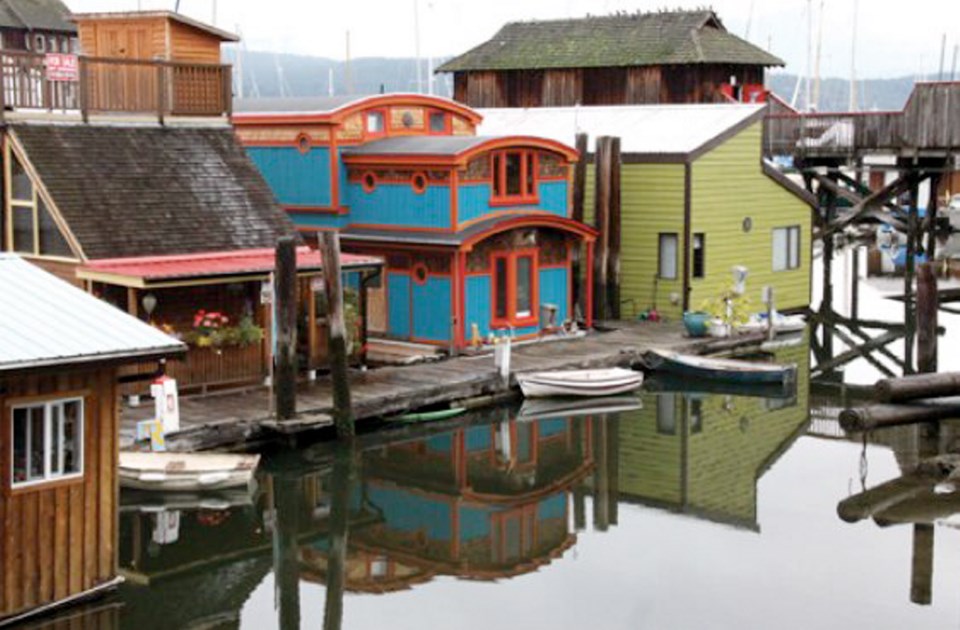Residents of Cowichan Bay's floating home community are anxious that a draft marine zoning bylaw may adversely affect the unique character of the seaside village.
The new zoning bylaw suggests that float homes be allowed only in a small, specially designated area.
If passed as it reads now, "this bylaw will displace approximately 100 residents that presently live at the eight marinas of Cowichan Bay, on both float homes and marine vessels. Where does the CVRD expect people to relocate to?" asked Julie Salisbury, who penned a statement on behalf of a group of float home owners this week.
The crux of a difficult situation is that the float home community has become established at Cowichan Bay in the face of an un-enforced bylaw from the late 1980s prohibiting marine residents in the area. Recent attempts to bring the zoning bylaw to today's standards are forcing the issue.
This community "expects to be included rather than ostracized in this new updated bylaw draft," Salisbury said.
Meetings with CVRD officials were held by the float home group last week, and some of the owners also attended an open house on the bylaw, hosted by area director Lori Iannidinardo last Thursday.
According to Salisbury, the few owners who are not treating their sewage already are begging, "Please hook us up and allow us the basic right to sewage disposal as is afforded to any other home on land."
Salisbury asked if the problems of a few are "really the reason for evicting all marine residents in this new bylaw?" She also said her group felt that not enough attention is being paid to other sources of raw sewage in Cowichan Bay, and that the problems of marina owners are being ignored, too.
"With marina owners' taxes increasing by 100 per cent this year, on top of expensive water leases, owners should be allowed to rent moorage to anyone who meets health and safety standards," she said, adding, "the new bylaw unfairly favours one marina owner by giving them an exclusive marine zone (M4A) and leaves some of the marinas at risk of losing up to half of their long-term customers, if forced to evict their live-aboard residents."
After talks with Iannidinardo, next up for the homeowners group is an appearance at the CVRD electoral area services committee meeting on Oct. 15.
The aim: to gain an immediate amendment to the new marine bylaw to recognize all float homes in the Bay as "legal non-conforming homes" and to get all the existing float homes hooked up to the sewer immediately.
Andrew Ludington, skipper of the liveaboard boat, At Ease, moored at the Bluenose Marina, said that he had hoped for more understanding from Iannidinardo but is more hopeful after hearing her personally last Thursday.
His type of boat, which is from the Great Lakes, cannot discharge overboard following an order from the U.S. Coast Guard. "My boat, for one, does not, as Lori said, 'poop in the bay'," he said. "I don't think anyone is doing that because we have a facility here that we pay $80 a month for where we have a washroom that we use. It has a laundry facility and two washrooms with showers."
He said he's concerned that Cowichan Bay's floating community is being singled out, although they are only one of many similar areas all down the West Coast.
"Floathomes are tolerated in San Francisco, in Seattle and Tacoma. It's a lifestyle, an expensive one, because they pay taxes, too. And slip fees, which are very expensive, and liveaboard fees so they can use the facilities if they so choose.
"I know of no float home owner that's irresponsible; they are all taking care of what needs to be done. It's our home. We have to take care of it, just like anybody on land would. It's especially true in our situation because what goes out with one tide comes back in with the next," Ludington said.
Iannidinardo said this week she really appreciated having the chance to hear last week from a large number of members of the float home community, calling their talks "a constructive dialogue".
The marine community had been particularly vocal on one subject and the director got the picture. "They want to be hooked up to the sewer system and I promise to work hard to help them to do that as soon as possible," she said.



